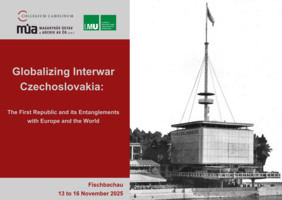Interwar Czechoslovakia emerged in a post-imperial context marked by the establishment of new borders and barriers. lndeed, historians have characterized the interwar in Europe as a period of de-globalization between the two major waves of globalization that took place before 1914 and in the postwar period. However, the construction of Czechoslovakia was based not only on a narrative of national exclusiveness. Given their ethos of democracy and progress, Czechoslovak elites also championed cosmopolitanism and a sense of being open to the world. The construction of Czechoslovakia involved participation in the circulation of ideas, people, goods, and capital.
So far, historians have addressed these networks mainly from the perspective of bilateral relations or by comparing two case studies. Only very recently has the question of Czechoslovakia's complex transnational, international, and global entanglements become the object of scholarship. The aim of this conference is to provide a forum to this new research. We want to examine the extent to which, in what ways, and with what limitations Czechoslovakia was integrated into the globalized world during the interwar period - in terms of politics, economics, culture and representation.
Supported by: Deutsche Forschungsgemeinschaft, Bayerisch-Tschechische Hochschulagentur, Bayerisches Staatsministerium für Wissenschaft und Kunst

